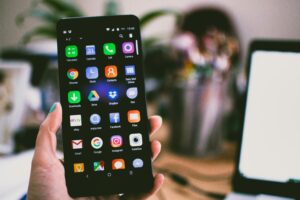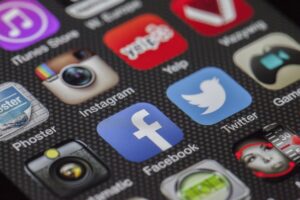By Life In Humanity Analysis Desk

Bill Gates, Mark Zuckerberg, and Silicon Valley’s secret: protecting kids from their own creations. They teach their kids to rule technology, not to be ruled by it. While digital overload defines most today homes across the world, that’s not the case for these tech leaders’ households. “Tech CEOs and founders, in a digital age where technology pervades every aspect of life, face a unique challenge: how to regulate their own children’s screen time amidst the very technologies they have helped create. Contrary to popular belief, many of these tech giants prioritise minimal technology use within their households, emphasizing a balanced approach to digital engagement.
Surprisingly, Silicon Valley children spend less time on screens, compared to their peers across America, according a survey done by The Information. This trend challenges the assumption that tech executives’ homes are immersed in gadgets. Some CEOs go as far as hiring nannies to monitor and limit their children’ screen time, underscoring their commitment to developing healthy digital habits from an early age,” reports Times of India with its 2 July 2024 story titled “Bill Gates, Mark Zuckerberg , and other tech leaders’ advice on limit kids’ screen time”.

In a world where children everywhere seem glued to screens, endlessly scrolling, gaming, or streaming, it is almost surreal to learn that the very architects of these technologies go to great lengths to shield their own children from them. That kids across the globe grow increasingly dependent on the digital devices characterize modern life—while Silicon Valley’s tech founders, Gates, Zuckerberg, and others, actively limit screen exposure at home, hire nannies to enforce boundaries, and cultivate habits which treasure real-world experiences over virtual ones—is remarkable, even strange.
The irony is striking: those who’ve brought these digital wonders into existence are among the most vigilant guardians against their addictive pull, highlighting a curious truth about technology and human behavior. The fact that these tech giants perform every endeavor to protect their children from their own creations constitutes a robust warning for the rest of us.
Tech innovators say no— raising children beyond screens
“But even one of humanity’s greatest technological innovators still banned his kids from having mobiles until they were 14, forbids them at the dinner table and limits his youngest’s screen time before she goes to bed”, reports The Mirror, in its 20 April 2017 story headlined “Billionaire tech mogul Bill Gates reveals he banned his children from mobile phones until they turned 14”. “Bill Gates is the legendary founder of the world’s largest software firm, Microsoft – a company that made him the richest man in the world.” He was then the wealthiest in the world, but “Gates, who held the title of world’s richest man for 18 years, has now slipped to 12th place in the Bloomberg rankings, right behind fellow tech mogul Michael Dell,” says Fox Business in its 13 July 2025.

The Mirror continues, saying “Father to Jennifer, 20, Rory, 17, and Phoebe, 14, he admits: ‘We often set a time after which there is no screen time and in their case that helps them get to sleep at a reasonable hour. You’re always looking at how it can be used in a great way – homework and staying in touch with friends – and also where it has gotten to excess.’”
He told Emily Retter who wrote the story “We don’t have cellphones at the table when we are having a meal, we didn’t give our kids cellphones until they were 14 and they complained other kids got them earlier.”
Retter was astounded by the simplicity of Gates, a man whose immense wealth seemed utterly invisible in his everyday demeanor. “There may be £67billion to his name but there’s nothing excessive or showy about the man in the flesh. Wearing an £8 Casio watch and assuring me that he had a ‘very nice curry last night.’”
Gates’ simplicity, as described by Retter, is a quality that ought to serve as a guiding principle for people everywhere— especially in a world where many consume, and let their children excessively consume technologies merely to signal modernity and sophistication. Technologies should be exploited appropriately, not to show your surrounding world that you are a civilized person.
Times of India says that Mark Zuckerberg also precludes excessive screen time. “As the co-founder of Facebook (now Meta), Mark Zuckerberg is cautious about his children’s screen time. While he permits video chats with relatives, Zuckerberg draws a line against excessive screen use for entertainment purposes. His approach emphasises active engagement over passive consumption, aiming to promote meaningful interactions beyond digital screens.

Reddit co-founder Alexis Ohanian and his wife Serena Williams prioritise offline activities for their daughter Olympia. While Ohanian looks forward to introducing video games in the future, he currently restricts screen time and encourages Olympia to engage with traditional toys and activities that stimulate creativity and imagination.”
In fact, those who profoundly know the platforms shaping our digital lives are not blind to their dangers. They enforce stricter rules at home than many ordinary families, revealing a striking paradox between their professional legacies and personal choices. The Mirror says “Former Facebook executive Chamath Palihapitiya has voiced profound concerns about social media’s impact on society. In response, he has imposed a strict ban on his own children using social media altogether, highlighting his critical stance on digital engagement.
Susan Wojcicki, former CEO of YouTube faces similar challenges in managing screen time for her children. Despite her professional ties to digital media, Wojcicki limits her kids’ screen time and advocates for moderation. She permits access to YouTube Kids under controlled conditions, emphasising the importance of balanced digital consumption.”
It is conspicuous that in the homes of humanity’s greatest technological innovators, screens are not king. Gates set the boundaries, helping his children to sleep, stay focused, and use technology for meaningful purposes, rather than excess. Zuckerberg limits entertainment-focused screen time for his children, while Ohanian encourages offline play and creativity, Palihapitiya bans social media for his kids, and Wojcicki emphasizes controlled, balanced access.
Across these households, the message is clear: technology constitutes a tool, not a toy; it should be harnessed with intention, moderation, and respect for real-world growth. In an age dominated by digital consumption, perhaps the most profound lesson from these tech titans is that the greatest innovation may be teaching our children how not to be enslaved by the very inventions we create.
Digital crisis especially among youth and recommended action
All sources we feature in this section consistently call for decisive action to address the digital crisis among youth, emphasizing responsible use, mental health awareness, and protective measures. Remarkably, these recommendations align perfectly with the mechanism implemented by the tech titans, Gates and Zuckerberg, among others. This convergence underscores a shared recognition that safeguarding young users requires both informed guidance and tangible, real-world action.

A case study— entitled “Excessive Mobile Phone Use Among Children and Adolescents (Ages 2 to 18)” published by Research Gate on 25 March 2025—points out “In the digital age, mobile phones have become an essential part of children’s and adolescents’ lives. However, excessive use has led to negative effects on physical, psychological, and social health, including reduced physical activity, eye strain, sleep problems, and social isolation.
The causes of this phenomenon include easy access to devices, lack of parental supervision, and parental neglect. There is an urgent need to raise awareness among families, schools, and the community about the importance of regulating mobile phone use and establishing clear guidelines to ensure safe and balanced usage.”
The study also recommends parents to regulate the use of the device and provide an interactive environment for children. It also advises educational institutions—schools and teachers— to enhance awareness of the risks of excessive use of use of mobile phones and furnish alternative stimulating activities. It suggests that the health sector—doctors especially pediatricians and psychologists— should offer therapeutic and awareness guidelines on the health and psychological harms.
The National University (NU) is a private, nonprofit institution based in San Diego, California, offering a wide range of undergraduate and graduate programs. In its undated piece entitled “The Negative Effects of Technology on Children”, it points out “From smartphones and social media to TV and tablet-based toys, today’s kids are constantly relating to technology. While it’s important for children and teens to develop an aptitude for technology, after all, they will use computers their whole lives, too much technology use can have detrimental health and physical effects.
The negative effects on children’s health run the gamut from increased risk of obesity to loss of social skills and behavioral problems. With children spending more time typing or tapping on a screen, they’re naturally spending less time outside or engaged in physical activities. Research has also found that people may engage in mindless eating while watching TV or playing video games. As a result, we’re seeing increased obesity rates in children and adolescents.”
This university underlines “This doesn’t mean parents need to ban technology entirely, but it’s important for parents to be aware of the potential effects of technology on children and develop strategies to limit their children’s screen time. Technology is everywhere, and while we cannot and should not ban technology entirely, we can set limits for our children to offset some of the negative effects. Too much screen time can affect your child’s physical health as well as their behavior.

Learn more about the physical and mental effects of too much of a good thing (read: technology) and discover what you can do to help. While children will naturally be interested in watching various programs, playing video games, and using app-based technology, it’s vital for parents to make sure children are getting enough physical activity. Encourage your kids to play outside. If time permits, join your kids in outdoor play. You can play games, like hide-and-seek or tag, or grab a mitt and a ball and play catch, or throw a frisbee around at a park.”
According to the National University, technology has profoundly reshaped the way we communicate and interact, affecting not only adults but children as well. For this reason, there exist problems associated with it. “Technology has completely changed the way we interact with each other. Even as adults, we are more prone to send a text vs. make a phone call. Similarly, we often behave differently on social media than we would in person. When kids spend a significant amount of time on social media, it can lead to lower self-esteem.
Teenagers are seeing curated content, a digital highlight reel, which can lead to distress due to teens comparing themselves to their peers. In general, technology use can cause social and behavioral problems in children because it minimizes the amount of time kids spend interacting with others.”
This higher learning institution highlights that attention span suffers considerably, because of the technologies. “Electronics, like smartphones and tablets, make it harder for people to concentrate and easier for people to be distracted by constant sounds and notifications. According to a research study in Canada, since technology use increased (around the year 2000) the average attention span has decreased from 12 seconds to eight seconds.
It’s challenging enough to teach kids patience, but how can we combat the negative effects of this always-on culture? One way is to limit technology use while children are focused on other tasks. Prohibit smartphone use while doing homework, encourage conversation during dinner time, and turn the TV off while children are reading.Encourage your kids to take time to unplug and disconnect. Get outside, interact with others, and engage in activities that don’t involve screens, like board games, books, and puzzles.”

The university strongly recommends “Make sure to monitor your child’s social media use and be aware of the types of websites they’re visiting and the games they’re playing online. Set up parental controls on computers, smartphones, and tablets to block inappropriate websites and apps. Also, try to keep the computer, game console, or TV in a common room so you can supervise your child’s technology use.
In addition to monitoring your child’s screen time, it’s also important to make sure they engage in social activities. Schedule playdates with friends and encourage your child to interact with others. Another great way to limit screen time and encourage physical activity and social interaction is to enroll your kids in a sports league. This way, they will have organized practices and games that will allow them to exercise and social with other kids their age.”
With regard to the management of screen time for children in effort to avoid that they are exposed to too much screen time, the National University says “ According to the American Academy of Child & Adolescent Psychiatry (AACAP), teenagers spend up to nine hours per day watching or using screens, and children ages eight to 12, spend four to six hours a day using screens. While some electronic use is vital for schoolwork, parents should try to limit screen time, be aware of the websites their kids are visiting, and make sure kids are spending their time watching high-quality educational content.
Mayo Clinic recommends limiting screen time to one hour per day for children between the ages of two and five. While there aren’t specific hour guidelines for every age group, The American Academy of Pediatrics (AAP) recommends that parents of kids between five and 18 place consistent limits on technology use. Try to monitor what they’re doing and that it’s not interfering with their schoolwork, health, or behavior. Your kids will grow up surrounded by screens and technology. If you establish good habits early on, you can offset the negative effects of technology on children.”
While telephones and modern technologies themselves may not directly harm the body, as the FDA says, the World Health Organization (WHO)’s recent findings reveal that their use—particularly through social media and gaming—can significantly harm adolescents’ mental health and well-being. In its 25 September 2024 story titled “New WHO report indicates need for healthier online habits among adolescents”, WHO states “New data from the WHO Regional Office for Europe reveals a sharp rise in problematic social media use among adolescents, with rates increasing from 7% in 2018 to 11% in 2022. This, coupled with findings that 12% of adolescents are at risk of problematic gaming, raises urgent concerns about the impact of digital technology on the mental health and well-being of young people.”
These findings, according to the WHO, have been generated by the Health Behaviour in School-aged Children (HBSC) study. It reportedly surveyed almost 280 000 young people aged 11, 13 and 15 across 44 countries and regions in Europe, central Asia and Canada in 2022. “More than 1 in 10 adolescents (11%) showed signs of problematic social media behaviour, struggling to control their use and experiencing negative consequences. Girls reported higher levels of problematic social media use than boys (13% vs 9%).

A third (34%) of adolescents played digital games daily, with more than 1 in 5 (22%) playing for at least 4 hours on days when they engage in gaming. 12 % of adolescents are at risk of problematic gaming, with boys more likely than girls to show signs of problematic gaming (16% vs 7%). The report defines problematic social media use as a pattern of behaviour characterized by addiction-like symptoms. These include an inability to control social media usage, experiencing withdrawal when not using it, neglecting other activities in favour of social media, and facing negative consequences in daily life due to excessive use.”
The rise in problematic social media use among adolescents raises significant concerns about potential impacts on young people, according to the WHO. “Previous research has found that problematic social media users also reported lower mental and social well-being and higher levels of substance use compared to non-problematic users and non-users. This trend, if continued, could have far-reaching consequences for adolescent development and long-term health outcomes. Moreover, problematic social media use has been associated with less sleep and later bedtimes, potentially impacting adolescents’ overall health and academic performance.”
“It’s clear that social media can have both positive and negative consequences on the health and well-being of adolescents,” noted Dr. Hans Henri P. Kluge, WHO Regional Director for Europe. “That’s why digital literacy education is so important. Yet it remains inadequate in many countries, and where it is available, it often fails to keep pace with young people and rapidly evolving technology. We are seeing the consequences of this gap, with worse likely to come, unless governments, health authorities, teachers and parents recognize the root causes of the current situation and take steps to rectify it.
As millions of children across the Region return to school after the summer holidays, some countries are considering restrictions or outright bans on social media for children up to a certain age. It’s clear we need immediate and sustained action to help adolescents turn the tide on potentially damaging social media use, which has been shown to lead to depression, bullying, anxiety and poor academic performance.”
This UN agency responsible for health on the planet suggests moderation. Dr. Natasha Azzopardi-Muscat works as the Director for Country Health Policies and Systems, WHO Regional Office for Europe. While stating “This study reveals both the promise and the pitfalls of digital engagement for our young people,” Azzopardi-Muscat higghlights “It’s crucial that we take steps to protect youth to allow them to navigate the digital landscape safely and equip them to make informed choices about their online activities, maximizing the benefits while minimizing the risks to their mental and social well-being. In short, they should rule social media, and not have social media ruling them.”
In this sense, the WHO’s warnings about problematic social media use cannot be separated from the widespread presence of telephones in young people’s lives. It is through these very devices that such excessive habits are established.